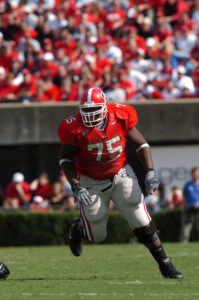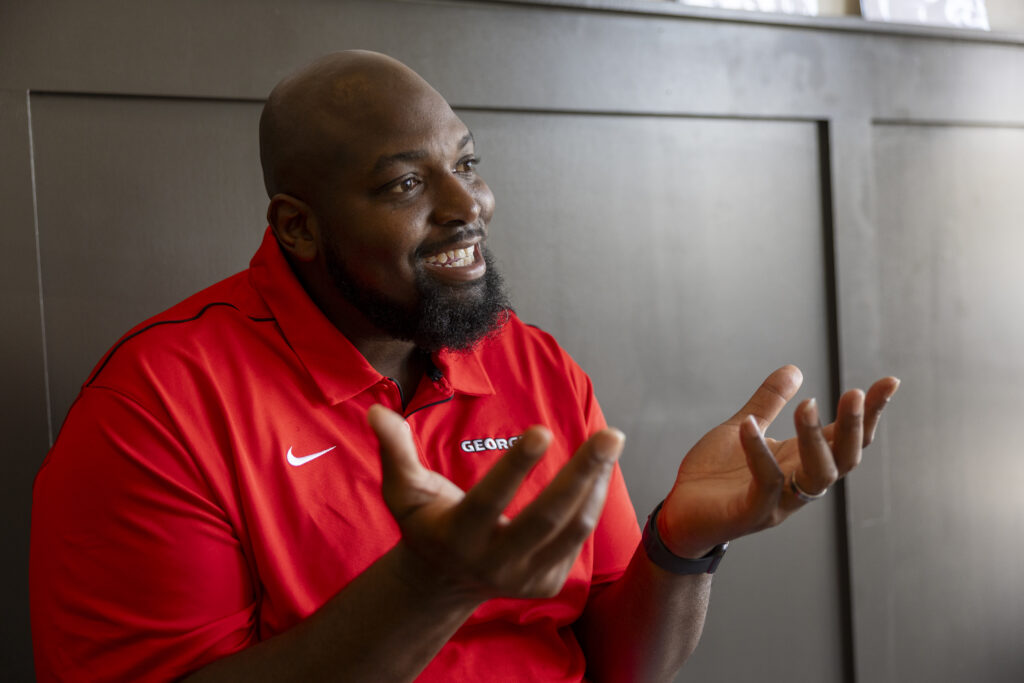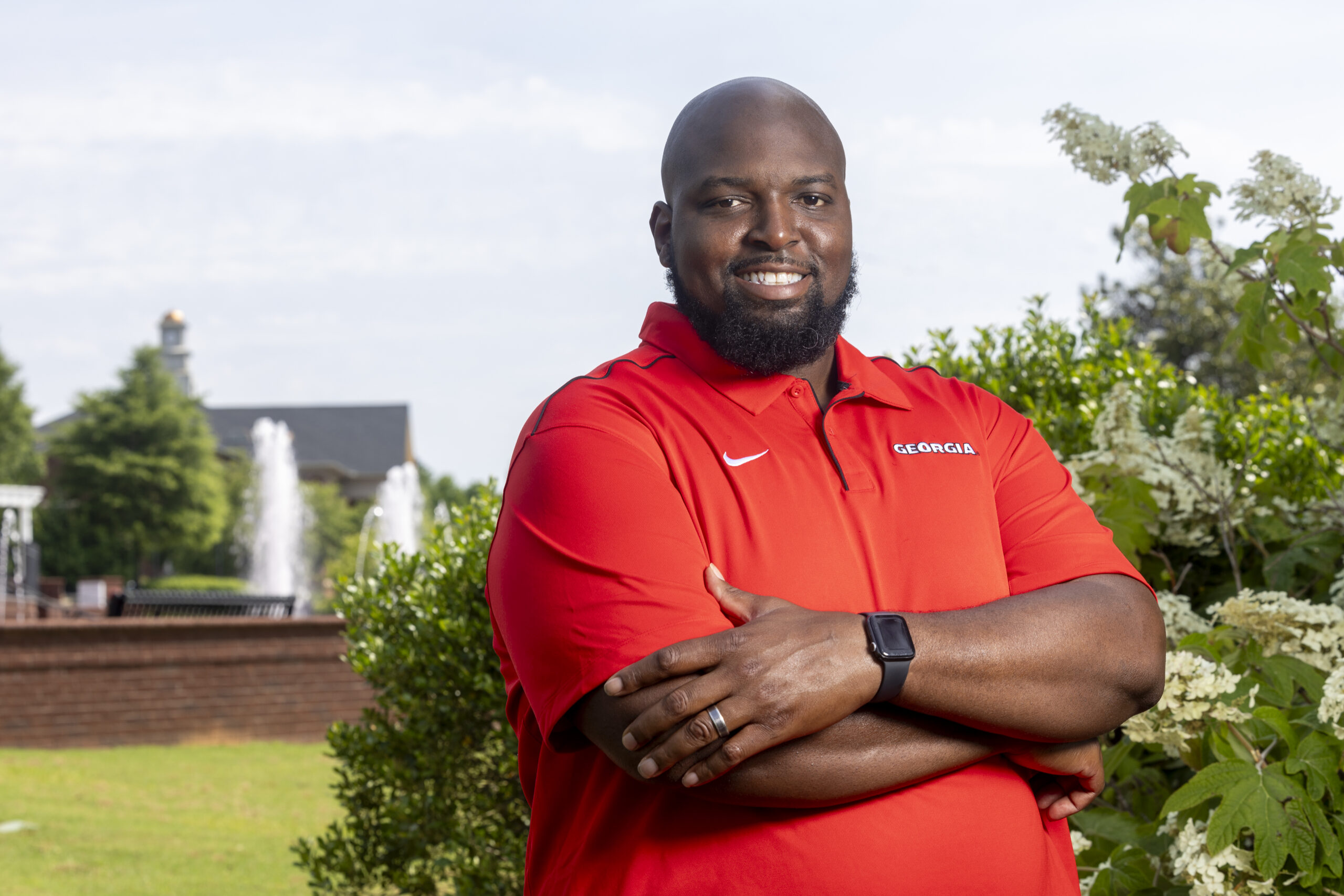Six years into his NFL career, Fernando Velasco hit his lowest point.
On Nov. 28, 2013, in front of a national television audience, Velasco—then the starting center for the Pittsburgh Steelers—ruptured his Achilles tendon in a game against the Baltimore Ravens. He missed the rest of the season, and his career appeared to be in jeopardy.
As he recovered physically, Velasco BSEd ’08 spiraled emotionally. While also dealing with the suicide of a close friend, Velasco plunged into depression.
Ray Jackson, the Steelers’ director of player development and a former NFL defensive back, helped bring Velasco back.
“He put his arm around me. He let me know that I was more than a football player,” Velasco recalls. “God had a bigger plan for me. During that moment, I knew exactly what I wanted to do. I knew that when my playing days were over, I wanted to get into player development and engagement.”
Every NFL team and major college football program employs staff members in player development and engagement. Many are former players, and they

serve in a mentorship role, helping players navigate their lives and careers off the field. With the modern game’s many distractions, the steady hand provided by the player development staff is crucial.
After working with Jackson, now vice president for player development with the Denver Broncos, Velasco rebounded. And his playing days were far from over. Velasco spent three more years in the NFL and was part of the Carolina Panthers team that played in Super Bowl 50. He retired in 2016, and one of his first calls was to Georgia head coach Kirby Smart BBA ’98.
He served as UGA’s assistant director of player development under the tutelage of director Jonas Jennings AB ’00 for three-and-a-half years. He moved to the University of Arkansas in 2020 as the Razorbacks’ director of player development. And in 2022, he was named director of player engagement for the Atlanta Falcons.
But Velasco credits his time as a student-athlete and staff member at the University of Georgia as foundational.
“Jonas said to just be myself,” Velasco says. “My peers had leaned on me. I had helped rookies when they came to the NFL. It came organically. I tell people all the time that my job doesn’t feel like work.”
At 6-foot-3, 300 pounds, Velasco cuts an authoritative figure. But he brings approachability mixed with gravitas to his presence. And he has for a long time.
“You need to start with the attributes of leadership—trustworthiness, hard work, being a guy everybody could count on. Fernando is one of those guys,” says Mark Richt, Georgia’s head coach from 2001 to 2015. Richt recruited Velasco to the Bulldogs and remains a guiding force.
“He did his job on a daily basis, and his coaches and teammates respected him for that. He had a desire to be great as a player and a person,” Richt says.
That desire to be great and to always learn and always improve began at an early age. Velasco was raised by his grandparents in tiny Wrens, Georgia, a town of less than 2,500 southwest of Augusta. He worked at the Jefferson County rec center in high school, which was his first encounter with mentoring others.
“My peers had leaned on me. I had helped rookies when they came to the NFL. It came organically. I tell people all the time that my job doesn’t feel like work.” — Fernando Velasco, director of player engagement with the Atlanta Falcons
When he came to the University of Georgia, he worked an off-campus summer job to make ends meet. He earned his degree in health and physical education with a plan to become a high school teacher and coach in case his NFL career didn’t blossom.
As it turns out, Velasco fulfilled his dreams. And he continues mentoring others.
He and his wife, Kamille BS ’09, lead the Velasco Family Foundation. In July, the organization ran a three-day “Life Ready Retreat” for 40 kids in partnership with Camp Lighthouse, Atlanta Mission, and Young Men’s United of Wrens. Amid the fun, the Velascos spoke about the importance of education, mental well-being, and financial literacy, and everyone completed dream-building vision boards.
Velasco doesn’t just preach the importance of education; he practices it. When he took the Arkansas job, he also enrolled as a student in a Master of Education program and earned his degree. Earlier this summer, he enrolled in an Ed.D. program at Penn State University. He starts classwork this fall.
“When I was growing up, I thought being a doctor only meant being a physician,” Velasco laughs. “Being a kid growing up in Wrens, Georgia, I didn’t think an undergraduate degree was possible. For me, I’m always thinking about what’s next. What can I better equip myself so I can better serve the people who trust me?”



